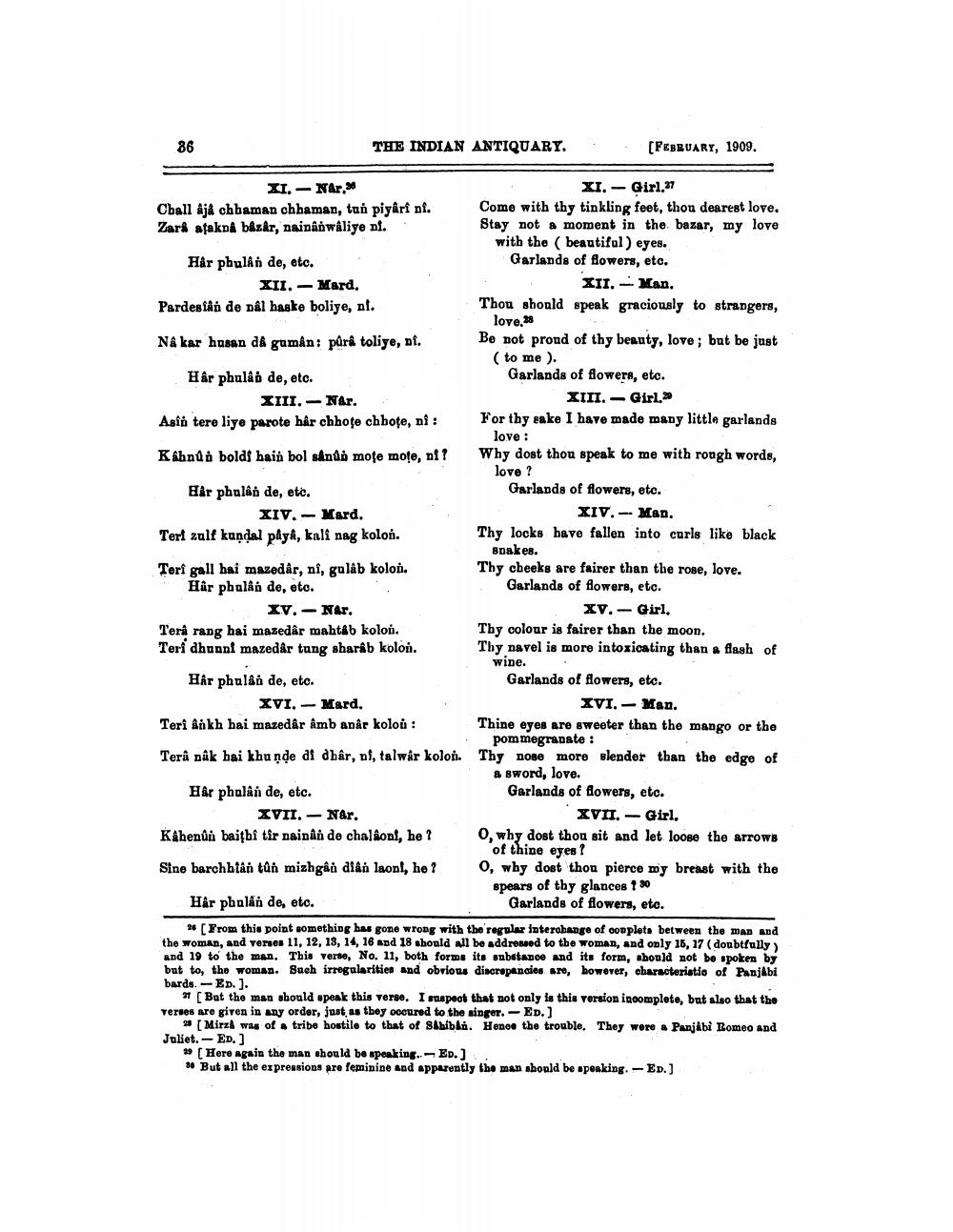________________
THE INDIAN ANTIQUARY.
.
[FEBRUARY, 1909.
XI. - NAr.»
XI. - Girl.27 Cball ajà chbaman chhaman, tan piyâri nf. Come with thy tinkling feet, thou dearest love. Zará atakpå bazár, Dainanwâliye ni.
Stay not a moment in the bazar, my love
with the beautiful eyes. Hår phulån de, etc.
Garlands of flowers, etc. XII. - Mard.
XII. - Man. Pardesiận de pâl haske bolige, nt.
Thou should speak graciously to strangers,
love.28 Nå kar husan d& gumán: pårå toliye, Df. Be not proud of thy beauty, love; but be just
( to me ). Hár phulâd de, etc.
Garlands of flowers, etc. XIII. - Nar.
XIII. - Girl. Asin tere liye parote hâr chhote chbote, ni : For thy sake I have made many little garlands
love : Kahnů å bold hain bol såntó mote mole, ni? Why dost thou speak to me with rough words,
love ? Har phulan de, etc.
Garlands of flowers, etc. XIV. - Mard.
XIV. - Man. Tert zulf kundal påyå, kali nag kolon.
Thy looks have fallen into curls like black
Bpakes. Teri gall hai mazedâr, ni, golâb kolor. Thy cheeks are fairer than the rose, love. Hür phalâ, de, eto.
Garlands of flowers, etc. xv. - Nar.
xv.-Girl. Terê rang hai mazedâr mahtab kolon.
Thy colour is fairer than the moon. Teri dhunn mazedår tung sharab kolon.
Thy navel is more intoxicating than a flash of
wine. . Hår phulâi de, etc.
Garlands of flowers, etc. XVI. - Mard.
XVI. - Man, Teri Ankh hai mazedâr amb anar koloù : Thine eyes are sweeter than the mango or the
pommegranate : Terâ nak hai kha nde di dhâr, ni, talwår kolon. Thy nose more slender than the edge of
& sword, love. Hår pholån de, etc.
Garlands of flowers, etc. XVII. - Nar.
XVII. - Girl, KAhenûn baitbi tîr painii de chalkont, he ? O, why dost thou sit and let loose the arrows
of Chine eyes ? Sine barchhián tún mizhgâà di&i laonl, he ? O, why dost thon pierce my breast with the
spears of thy glances 1 30 Hår pholán de, etc.
Garlands of flowers, etc.
# [From this point something has gone wrong with the regular interchange of couplets between the man and the woman, and verses 11, 12, 13, 14, 16 and 18 should all be addressed to the woman, and only 16, 17 (doubtfully) and 19 to the man. This verte, No. 11, both forms its substance and its form, ahould not be spoken by but to, the woman. Sach irregularities and obvious discrepancies are, however, characteristio of Panjabi bards.- ED.).
31 But the man should speak this verso. I mapoot that not only is this version incompleto, but also that the verses are given in any order, just as they occured to the singer. -ED.)
> Mirzl was of tribe hostilo to that of Sibibdi. Hence the trouble. They were a Panjabi Romeo and Juliet.- ED.)
» (Here again the man should be speaking.. ED.) * But all the expressions pro feminine and apparently the man should be speaking. -Ed.)




